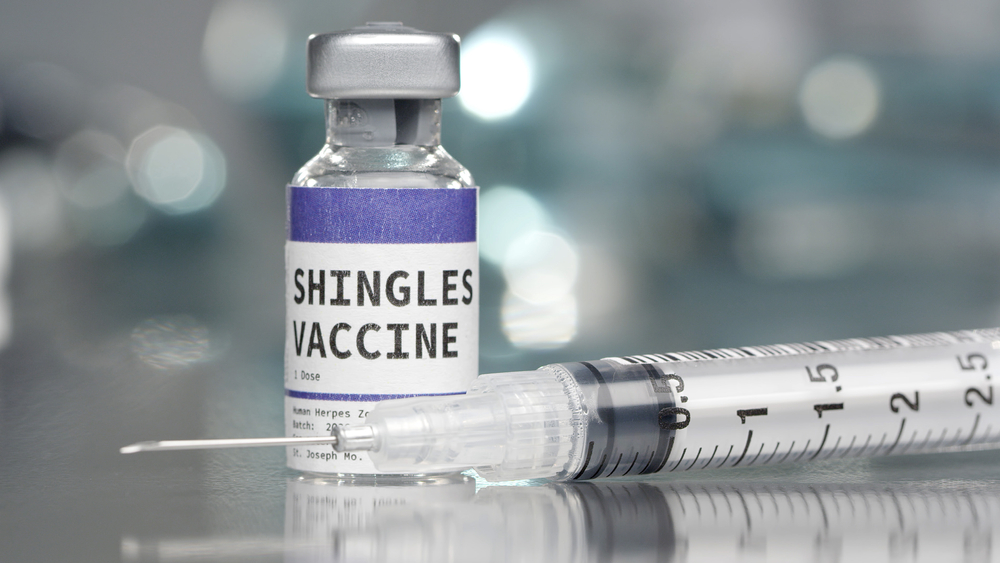The recombinant zoster vaccine known as SHINGRIX may also lower the risk of developing dementia, according to a new study. The vaccine prevents shingles, a painful viral infection, and is typically recommended for those 50 and older.
Researchers in the U.K. published a study in Nature Medicine on July 25 that showed that among people diagnosed with dementia, those who received the recombinant zoster vaccine had more diagnosis-free time compared with those who received a different vaccine.
The study adds to previous evidence that the recombinant zoster vaccine may lower dementia risk.
The link between chickenpox and shingles
Shingles results from the reactivation of the varicella-zoster virus, which causes chickenpox. Chickenpox is a highly contagious disease that many of us had when we were children. It causes a blister-like rash, but one exposure is usually enough to provide immunity. A varicella vaccine has been available since 1995 and has reduced the number of people contracting the disease.
After recovery from chickenpox, the varicella-zoster virus becomes inactive but remains in the body. It may reactivate later as shingles. Shingles is more common in older adults and people with weakened immune systems. Shingles is also called herpes zoster because it is in the same viral family as other herpes viruses.
The findings: more dementia-free time
The study took advantage of a natural experiment opportunity created by a change in United States healthcare practices around 2017. That’s when healthcare providers switched from a live attenuated vaccine to a recombinant zoster vaccine to inoculate people against shingles. Researchers used electronic health records to evaluate the incidence of dementia during the six years after individuals received the vaccination. The study included about 200,000 people, half receiving the live attenuated vaccine and half receiving the recombinant zoster vaccine.
They found that for individuals who were subsequently diagnosed with dementia, those who received the recombinant zoster vaccine had a 17% increase in dementia-free time. This translated to 164 additional days without a diagnosis.
Why the recombinant zoster vaccine may protect against dementia
Two main theories explain why the recombinant zoster vaccine may lower dementia risk. First, studies have suggested that infection with a herpes virus (including varicella-zoster) increases the risk of developing dementia. The recombinant zoster vaccine is 97% effective at preventing shingles by stopping reactivation of the herpes virus that causes chickenpox.
Second, experts believe the recombinant zoster vaccine’s specific way of stimulating the immune system might also reduce dementia risk.
Paul Offit, a vaccine expert from the University of Pennsylvania, believes in the possibility of a connection between the recombinant zoster vaccine and reduced risk of dementia. “I think it’s real,” he told the Washington Post. Other experts agree more research is needed, but acknowledge the growing evidence that infection may play a role in dementia.

The growing interest in preventing dementia
Shingles affects one in three people during their lifetime. While it’s rarely life-threatening, it can cause painful symptoms, including a blistering rash. In some cases, shingles can lead to blindness or long-lasting nerve pain.
Given these risks, the potential for the recombinant zoster vaccine to prevent not only shingles but also dementia is exciting. Vaccine researcher Peter Hotez told the Washington Post that if the connection is confirmed, it could provide “another carrot” to encourage more people to get vaccinated.
Currently, only 18.6% of Americans aged 50 and older have received the recombinant zoster vaccine. With more studies showing that the vaccine may lower dementia risk, this number could rise as awareness grows.
Additional studies supporting the link
The study published in Nature Medicine isn’t the only one to suggest that a shingles vaccine may lower dementia risk.
Similar findings were presented at the 2024 Alzheimer’s Association International Conference in Philadelphia. Researchers analyzed the health records of hundreds of thousands of people across the U.S. The findings revealed that individuals who received the recombinant zoster vaccine were 20% less likely to be diagnosed with dementia within five years than those vaccinated for a different illness.
A study conducted in Wales and published in 2023 included people who received Zostavax, a live attenuated vaccine. The study showed they had a 22.4% lower risk of being diagnosed with dementia in the seven years following vaccination.
These studies, while not identical in their findings, add to a growing body of evidence that the shingles vaccine may lower dementia risk. As Phil Dormitzer of GSK, the maker of SHINGRIX, told the Washington Post, “We are seeing different groups, different methodologies, coming up with broadly similar results.”
A promising future
The possibility that the recombinant zoster vaccine may lower dementia risk offers hope in the fight against Alzheimer’s and other forms of dementia. While more research is needed, experts are optimistic.
If further research confirms that the recombinant zoster vaccine reduces dementia risk, it could change how we approach both disease prevention and aging. In the meantime, the evidence suggests that the vaccine could be a crucial step forward in combating one of the most challenging conditions of our time.
See a summary of the Parsemus Foundation’s Alzheimer’s Disease Prevention Project here. See our other blog posts on the topic here.



